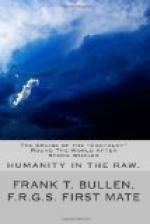Most of them belonged there, and although there was but the faintest prospect of their getting ashore upon any pretext whatever, the possibility of seeing their island homes again seemed to quite transform them. Hitherto they had been very moody and exclusive, never associating with us on the white side, or attempting to be at all familiar. A mutual atmosphere of suspicion, in fact, seemed to pervade our quarters, making things already uncomfortable enough, still more so. Now, however, they fraternized with us, and in a variety of uncouth ways made havoc of the English tongue, as they tried to impress us with the beauty, fertility and general incomparability of their beloved Cape Verds. Of the eleven white men besides myself in the forecastle, there were a middle-aged German baker, who had bolted from Buffalo; two Hungarians, who looked like noblemen disguised —in dirt; two slab-sided Yankees of about 22 from farms in Vermont; a drayman from New York; a French Canadian from the neighbourhood of Quebec; two Italians from Genoa; and two nondescripts that I never found out the origin of. Imagine, then, the babel of sound, and think—but no, it is impossible to think, what sort of a jargon was compounded of all these varying elements of language.
One fortunate thing, there was peace below. Indeed, the spirit seemed completely taken out of all of them, and by some devilish ingenuity the afterguard had been able to sow distrust between them all, while treating them like dogs, so that the miseries of their life were never openly discussed. My position among them gave me at times some uneasiness. Though I tried to be helpful to all, and was full of sympathy for their undeserved sufferings, I could not but feel that they would have been more than human had they not envied me my immunity from the kicks and blows they all shared so impartially. However, there was no help for it, so I went on as cheerily as I could.
A peculiarity of all these vessels, as I afterwards learned, was that no stated allowance of anything was made. Even the water was not served out to us, but was kept in a great scuttle-butt by the cabin door, to which every one who needed a drink had to go, and from which none might be carried away. No water was allowed for washing except from the sea; and every one knows, or should know, that neither flesh nor clothes can be cleansed with that. But a cask with a perforated top was lashed by the bowsprit and kept filled with urine, which I was solemnly assured by Goliath was the finest dirt-extractor in the world for clothes. The officers did not avail themselves of its virtues though, but were content with lye, which was furnished in plenty by the ashes from the galley fire, where nothing but wood was used as fuel. Of course when rain fell we might have a good wash, if it was night and no other work was toward; but we were not allowed to store any for washing purposes. Another curious but absolutely necessary




